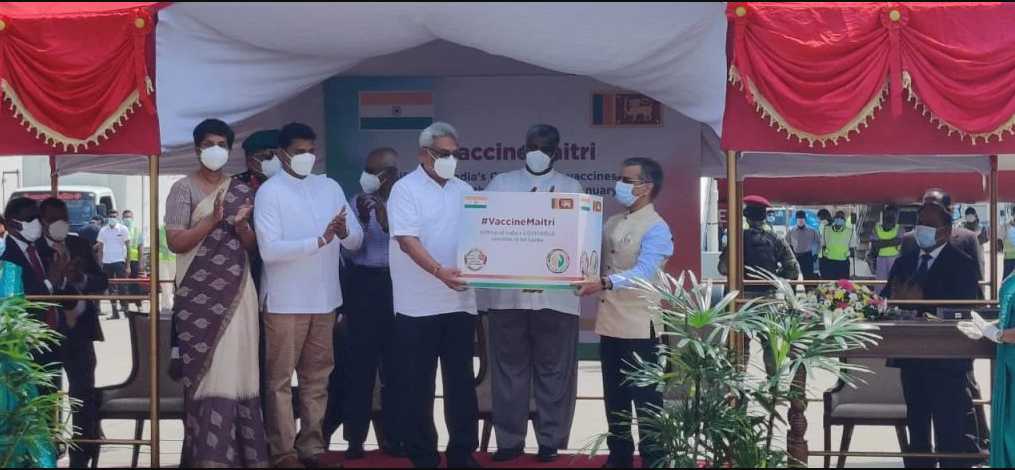Coronavirus vaccines gifted by India arrived in Sri Lanka today in a special Air India flight.
Under the Government of India’s #VaccineMaitri, India has gifted 500,000 doses of made in India COVISHIELD vaccines to Sri Lanka.
The consignment was transported in a special Air India flight and packed in tailor-made boxes for the purpose.
Indian High Commissioner to Sri Lanka Gopal Bagley formally handed over the consignment to President Gotabaya Rajapaksa at the Bandaranaike International Airport in Katunayake today.
Senior Advisor to the President and Head of the Presidential Task Force for Sri Lanka’s COVID-19 vaccination drive Lalith Weeratunga said any citizen is entitled to the right to refuse to be vaccinated.
The President’s Media Division quoting Weeratunga said obtaining the vaccine will be at the discretion of any citizen.
The first consignment of the Indian government-gifted AstraZeneca Covidshield vaccines was officially handed over to President Gotabaya Rajapaksa by High Commissioner of India Dr Gopal Baglay at the Colombo airport on Thursday (28) morning.
President Gotabaya Rajapaksa recently requested the Indian Prime Minister Narendra Modi for the vaccines to be used in Sri Lanka.
Oxford-Astrazeneca’s COVISHIELD vaccine is manufactured by Serum Institute of India.
The consignment weighing 1323 kilograms was transported in special freezers in a special Air India Flight AI 218 and it reached the Katunayake Airport at 11:45 AM on Thursday (28).
The President’s Media Division said the vaccines will be stored in special freezer facilities at the airport and thereafter will be transported to all districts in the country.
It must be stored in 2-8 degree Celsius freezers, which Sri Lanka has facilities for at district as well as MOH levels.
The vaccines will be distributed among frontline Health workers, Army, Navy, and Air Force personnel, Policemen on a priority basis.
‘This Covidshield vaccine injected in two doses per person will be first used at Colombo National Hospital, Ragama Hospital, and six other hospitals, including the Colombo Army Hospital and the Panagoda Army Hospital beginning tomorrow (29),’ reported the Sri Lanka Army Website, quoting the Army Commander.
‘From the day after tomorrow, it will be taken to other areas and all Army Hospitals as planned. In fact, we had a few rounds of rehearsals for transport, storing, inoculation, and other measures before today,it added.
According to the Sri Lanka Army Website, this vaccination is restricted strictly to those whose names have already been listed and the entire programme will remain very transparent.
Deputy Director-General of Health Services, Dr. Hemantha Herath said frontline healthcare workers will receive the jab at six main hospitals in and around Colombo.
Thereby, the COVID-19 vaccination drive will begin tomorrow at the Colombo National Hospital, Colombo North Teaching Hospital-Ragama, Colombo-South Teaching Hospital, Homagama Base Hospital, Colombo East Base Hospital Mulleriyawa, and the Infectious Disease Hospital in Angoda.
The first recipients of the vaccine will be 250,000 personnel in the health service sector and members of the Armed Forces and Police who are deployed in the quarantine and intermediate Covid treatment facilities.
A survey conducted by the Ministry of Health to determine the attitudes of the people with regard to the COVID-19 vaccine has shown that 8 percent preferred not to be vaccinated.
57.4 percent of healthcare workers have confirmed that they will be receiving the vaccine, while 37 percent said they are uncertain on whether or not to receive the jab, the report compiled by the Ministry of Health based on data collected through the survey showed.
Based on the report, of the total sample used for the survey, 54 percent preferred to obtain the vaccine, if it is being provided; while 38 percent were uncertain about being vaccinated.
The Ministry of Health has released the report as the country’s COVID-19 vaccination drive is set to begin on Friday (Jan. 29), with frontline healthcare workers receiving the jab first.


